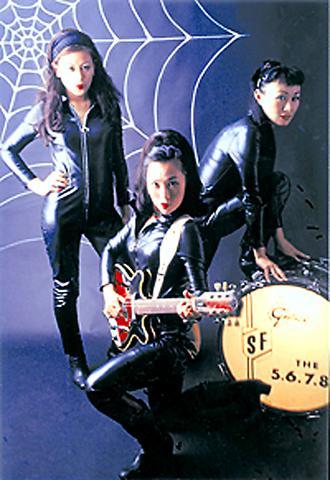Appearing in Quentin Tarantino's Kill Bill: Vol. 1 in 2002, The 5,6,7,8's stepped into the international limelight. But this weekend, for the first time, they step onto Taiwan. As the retro-pop punk band rehearsed two days before coming, they spoke to the Taipei Times and showed they're not just about their quirky retro outfits, but are all about the music.
Taipei Times: This is the first time to Taiwan. What do you want to do when you get here?
Ronnie Fujiyama (lead singer): Honestly I don't know much about Taiwan except that there are a lot of good foods there. So we hope to try out different foods.

TT: Can you introduce the members of your band?
RF: There are more than three vocalists working on the band, but as we are not a mainstream musical band, and don't make enough money everyone has other jobs to make a living.
For the three vocals there's me, Yoshiko Ronnie Fujiyama ? my real name is actually Yoshiko Fuji, but it gets confused with the second member, Sachiko Fuji. I've changed my family name to Fujiyama. Ronnie was added to my name cuz on the set of Kill Bill there was another girl called Yoshiko.
Sachiko Fuji works at a vintage costume store. And Akiko Omo is the busiest. She's a graphic designer.
TT: How did the idea of retro "punk pop music" come about?
RF: We all like 1960s music.
TT: Where do you get your costumes?
RF: We make them ourselves. And we also got some from the set of Kill Bill.
TT: What about the hair? Is that real hair?
RF: It's real. I just really like the retro look. I asked the hairdresser to teach me how to make our hair like that. It takes about 30 minutes every time to set it up.
TT: Quentin Tarantino said you girls are his favorite band. What do you think of that?
RF: Well, we are happy to hear about that. We're happy if anyone likes our music. It doesn't matter if it's someone as famous as Tarantino. Even if it was the ojisan (old grandpa) next door saying that it would make us happy.

Under pressure, President William Lai (賴清德) has enacted his first cabinet reshuffle. Whether it will be enough to staunch the bleeding remains to be seen. Cabinet members in the Executive Yuan almost always end up as sacrificial lambs, especially those appointed early in a president’s term. When presidents are under pressure, the cabinet is reshuffled. This is not unique to any party or president; this is the custom. This is the case in many democracies, especially parliamentary ones. In Taiwan, constitutionally the president presides over the heads of the five branches of government, each of which is confusingly translated as “president”

Sept. 1 to Sept. 7 In 1899, Kozaburo Hirai became the first documented Japanese to wed a Taiwanese under colonial rule. The soldier was partly motivated by the government’s policy of assimilating the Taiwanese population through intermarriage. While his friends and family disapproved and even mocked him, the marriage endured. By 1930, when his story appeared in Tales of Virtuous Deeds in Taiwan, Hirai had settled in his wife’s rural Changhua hometown, farming the land and integrating into local society. Similarly, Aiko Fujii, who married into the prominent Wufeng Lin Family (霧峰林家) in 1927, quickly learned Hoklo (commonly known as Taiwanese) and

The low voter turnout for the referendum on Aug. 23 shows that many Taiwanese are apathetic about nuclear energy, but there are long-term energy stakes involved that the public needs to grasp Taiwan faces an energy trilemma: soaring AI-driven demand, pressure to cut carbon and reliance on fragile fuel imports. But the nuclear referendum on Aug. 23 showed how little this registered with voters, many of whom neither see the long game nor grasp the stakes. Volunteer referendum worker Vivian Chen (陳薇安) put it bluntly: “I’ve seen many people asking what they’re voting for when they arrive to vote. They cast their vote without even doing any research.” Imagine Taiwanese voters invited to a poker table. The bet looked simple — yes or no — yet most never showed. More than two-thirds of those

In the run-up to the referendum on re-opening Pingtung County’s Ma-anshan Nuclear Power Plant last month, the media inundated us with explainers. A favorite factoid of the international media, endlessly recycled, was that Taiwan has no energy reserves for a blockade, thus necessitating re-opening the nuclear plants. As presented by the Chinese-language CommonWealth Magazine, it runs: “According to the US Department of Commerce International Trade Administration, 97.73 percent of Taiwan’s energy is imported, and estimates are that Taiwan has only 11 days of reserves available in the event of a blockade.” This factoid is not an outright lie — that